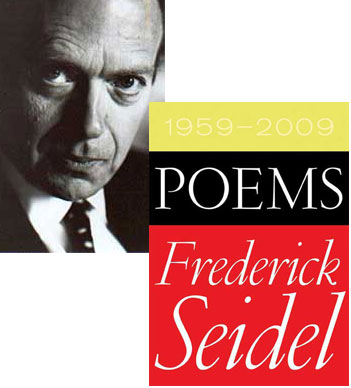Frederick Seidel, “The Big Golconda Diamond”

The Master Jeweler Joel Rosenthal, of the Bronx and Harvard,
Is Joel Arthur Rosenthal of JAR, place Vendôme.
The greatest jeweler of our time
Has brought to Florida from his afe
A big Golconda diamond that is matchless,
So purely truthful it is not for sale, Joel’s favorite, his Cordelia.
His mother in Florida can keep it
If she wants, and she doesn’t want.
Love is mounted on a fragile platinum wire
To make a ring not really suitable for daily wear.I wore the bonfire on a wire, on loan from Joel,
One sparkling morning long ago in Paris.
I followed it on my hand across the pont des Arts
Like Shakespeare in a trance starting the sonnet sequence.
As a recognition (or endorsement) of the cultural significance of the publication of Poems: 1959-2009, the New York Times Magazine ran a profile of Frederick Seidel last weekend; the magazine piece addresses, among other things, the long period of silence following his first publication, a silence he explains came about because he was afraid to confront “the expression of aspects of the self that you understand or, rather, that you fancy may not be attractively expressed or attractive once expressed.”
“Another way of talking about this is to talk about your becoming yourself: your finding who you are as a poet, finding what you sound like, finding your subjects that bring you out of you that are your subjects. It’s almost as if there’s a moment when you decide, Well, whatever the problem of writing this way, of writing these things, whatever the difficulty with presenting yourself this way . . . well, that’s it.“
Other Seidel poems include “Poem by the Bridge at Ten-shin” (from The New Yorker), “Prayer” (from Vallejo Nocturno), and “Ode to Spring” (from Poets.org). In addition, the Macmillan page dedicated to Seidel has several audio recordings of the poet reading from his work.
13 April 2009 | poetry |
Poetry and the Creative Mind
Last week, because I was otherwise engaged, Mrs. Beatrice was kind enough to sit in on what is usually one of my favorite literary events of the year, and took copious notes:
A few minutes after I took my seat at the magnificent new Alice Tully Hall for the The Academy of American Poets’ 7th Annual Poetry and the Creative Mind program, Lucie Brock-Broido walked into the auditorium and sat down immediately in front of me. An auspicious beginning indeed. Perhaps even more auspicious was the line-up of people slated to read: Rose Styron; Joan Baez; Roy Blount, Jr. (I confess to having been a closet Roy Blount, Jr. groupie since around 1990, so I probably blushed a little when he walked onto the stage); Jorie Graham; Maggie Gyllenhaal, Chip Kidd; Wynton Marsalis; Steve Reich; Mark Strand; and Harold Varmus.
Although all the readers impressed in various ways, several points in the evening stood out. First was Jorie Graham’s interpretation of James Wright’s almost palpably taut poem “Hook.†“Hook†is a breathtaking work under any circumstances, but its qualities became even more evident after Graham’s moving reading, which caused a murmur of admiration to ripple through the audience.
The other standout was musician Wynton Marsalis. Marsalis noted that he was from New Orleans, and, like all New Orleans natives, talked as though he were singing, in minor thirds. And talk and sing he did, as he gave a gorgeous half-sung, half-spoken rendition of Sterling A. Brown’s “Riverbank Blues.†Marsalis brought slightly less melodic but no less musical qualities to the rest of his readings, especially to Hart Crane’s intricate “Carmen De Boheme.â€
The music continued as Joan Baez, after reading two of her own poems—“Colleen†and “Low, Low Impact Class‗(“I’m breaking the rules, because I’m not dead yet†she quipped), sang “Joe Hill,” accompanied by Marsalis on trumpet. And yes, the performance was as good as you think it was.
11 April 2009 | poetry |

 Our Endless and Proper Work is my new book with Belt Publishing about starting (and sticking to) a productive writing practice.
Our Endless and Proper Work is my new book with Belt Publishing about starting (and sticking to) a productive writing practice. 
